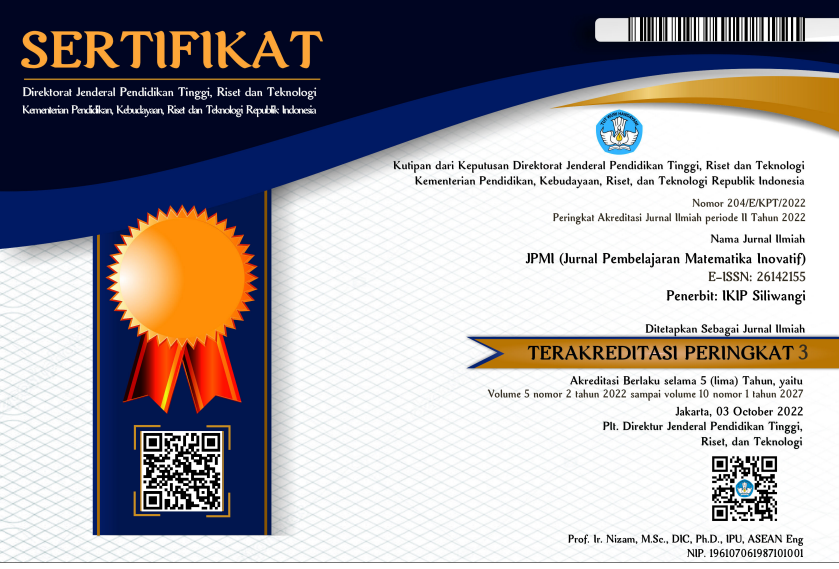Meningkatkan Kemampuan Pemecahan Masalah Matematik dan Self Efficacy Siswa SMP Menggunakan Pendekatan Contextual Teaching and Learning
DOI:
https://doi.org/10.22460/jpmi.v2i5.p253-260Keywords:
Mathematical Problem Solving, Self Efficacy, Contextual Teaching and Learning ApproachAbstract
This study aimed to determine the improvement of mathematical problem solving abilities and self efficacy students of  Junior High School through the Contextual Teaching and Learning approach. The method of this research is the quasi-experimental method with the research design of the post-test control group design. The population in this study was the seventh grade of  SMPN 1 TelukJambe Barat City of  Karawang. Determination of the sample is done by the technique used which is not random so the class selected as the experimental class is class VII D and VII A as the control class. Instruments given to students in the form of test questions (pretest-posttest) related to indicators of mathematical problem solving abilities. Analysis of data processing was carried out on the results tests of mathematical problem solving abilities of students at SMPN 1 TelukJambe Barat. To get the research data, the instruments were used in the form of tests (pretest-posttest) and self efficacy scale. The analysis of the study used the average difference test. The results of the study concluded: (1) Achievement and improvement of mathematical problem solving skills that are learned by using contextual teaching and learning approaches are better than students who receive learning with a scientific approach. (2) Mathematical self efficacy of students who learn to use Contextual Teaching and Learning is better than students with learning using a scientific approach.
References
Hairida, H., & Erlina, E. (n.d.). Korelasi antara Self-efficacy dengan Hasil Belajar Siswa dalam Mata Pelajaran Kimia di SMA. Jurnal Pendidikan Dan Pembelajaran Untan, 2(9).
Hendriana, H. (2012). Pembelajaran matematika humanis dengan metaphorical thinking untuk meningkatkan kepercayaan diri siswa. Infinity Journal, 1(1), 90–103.
Hendriana, H., & Afrilianto, M. (2017). Langkah Praktis Penelitian Tindakan Kelas Bagi Guru. Bandung: Refika Aditama.
Hendriana, H., & Soemarmo, U. (2017). Penilaian Pembelajaran Matematika Edisi Revisi. Bandung: PT Refika Aditama.
Hidayat, W., & Sariningsih, R. (2018). Kemampuan Pemecahan Masalah Matematis dan Adversity Quotient Siswa SMP Melalui Pembelajaran Open Ended. JNPM (Jurnal Nasional Pendidikan Matematika), 2(1), 109–118.
Mareta Dwi Rakhmada, Y. (2014). Pendekatan Hands On Activity Melalui Modified Inquiry Untuk Meningkatkan Self Efficacy Siswa Kelas Xisman 1 Tuban Pada Materi Pokok Laju Reaksi (Hands On Activity Approach Through Modified Inquiryto Improve Self Efficacy In Xi Grade Of Sman 1 Tubansubject Matter Of The Rate Of Reaction). Unesa Journal Of Chemical Education, 3(1).
Muslich, M. (2007). KTSP: pembelajaran berbasis kompetensi dan kontekstual, panduan bagi guru, kepala sekolah, dan pengawas sekolah. Bumi Aksara.
Ramachandran, V. S. (2012). Encyclopedia of human behavior. Academic Press.
Rusman, D., & Pd, M. (2012). Model-model pembelajaran. Raja Grafindo, Jakarta.
Suherman, E. (2003). Evaluasi pembelajaran matematika. Bandung: Upi.
Sumarmo, U. (2013). Berpikir dan Disposisi matematik serta Pembelajarannya. Universitas Pendidikan Indonesia. Bandung.
Zanthy, L. S. (2016). Pengaruh Motivasi Belajar Ditinjau dari Latar Belakang Pilihan Jurusan Terhadap Kemampuan Berpikir Kritis Mahasiswa di STKIP Siliwangi Bandung. Teorema: Teori Dan Riset Matematika, 1(1), 47–54.

















